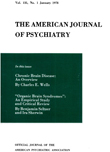SOME REACTIONS SEEN AFTER ELECTRIC SHOCK TREATMENT
Abstract
We have presented some evidence to illustrate an interesting by-product of electric shock treatment. A few days after shock treatment was terminated, a psychotic reaction appeared, differing in its gross clinical manifestations from the clinical picture which was present when shock treatment was started. It differs from the state of confusion that one usually meets in the course of shock treatment. Such late post-treatment psychotic episodes last anywhere from a few days to a few weeks and then subside. With its evanescence the original clinical complaints of the patient usually subsided.
It was felt that the picture could not be entirely explained alone by organic brain damage and to a large extent was dependent upon the personality structure of the patient.
The technical suggestion is made that when such a reaction develops, treatment should not be immediately reinstituted. One should wait, a few weeks if necessary, in view of the fact that in all our patients the psychotic episode subsided.
Access content
To read the fulltext, please use one of the options below to sign in or purchase access.- Personal login
- Institutional Login
- Sign in via OpenAthens
- Register for access
-
Please login/register if you wish to pair your device and check access availability.
Not a subscriber?
PsychiatryOnline subscription options offer access to the DSM-5 library, books, journals, CME, and patient resources. This all-in-one virtual library provides psychiatrists and mental health professionals with key resources for diagnosis, treatment, research, and professional development.
Need more help? PsychiatryOnline Customer Service may be reached by emailing [email protected] or by calling 800-368-5777 (in the U.S.) or 703-907-7322 (outside the U.S.).



